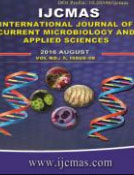


 National Academy of Agricultural Sciences (NAAS)
National Academy of Agricultural Sciences (NAAS)

|
PRINT ISSN : 2319-7692
Online ISSN : 2319-7706 Issues : 12 per year Publisher : Excellent Publishers Email : editorijcmas@gmail.com / submit@ijcmas.com Editor-in-chief: Dr.M.Prakash Index Copernicus ICV 2018: 95.39 NAAS RATING 2020: 5.38 |
Biodegradable films prepared using muscle protein from fish waste and processing discard (FG), fish gel with potato starch (FGS), fish gel with butylated hydroxy toluene (FGB) and Fish Gel with ascorbic acid (FGA) were of thickness ranging from 0.08 to 0.09 mm. These films were analysed for their physical, mechanical, and barrier properties. FGA had significantly higher elasticity (126.21%), and tensile strength (1.19 MPa) with lower water vapour permeability (0.3940 ± 0.0051 g/cm2/day), oxygen permeability (174 ml/m2xday) and water solubility (12.18%). Therefore, FGA had better tensile strength, lower barrier properties and less water solubility compared to FG, FGS and FGB. Mechanical properties of this film were similar to the films prepared from other biological origins. The result indicated that the biodegradable film from fish waste and processing discard muscle protein with ascorbic acid as antioxidant was suitable for application in food packaging.
 |
 |
 |
 |
 |